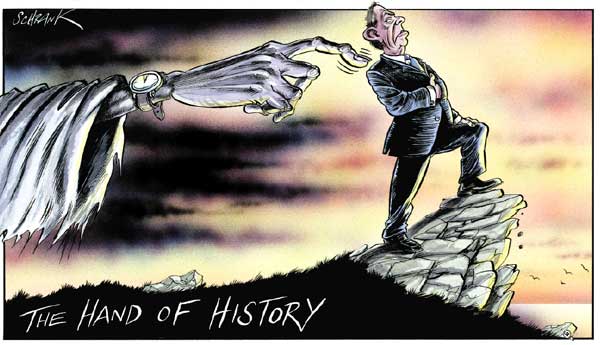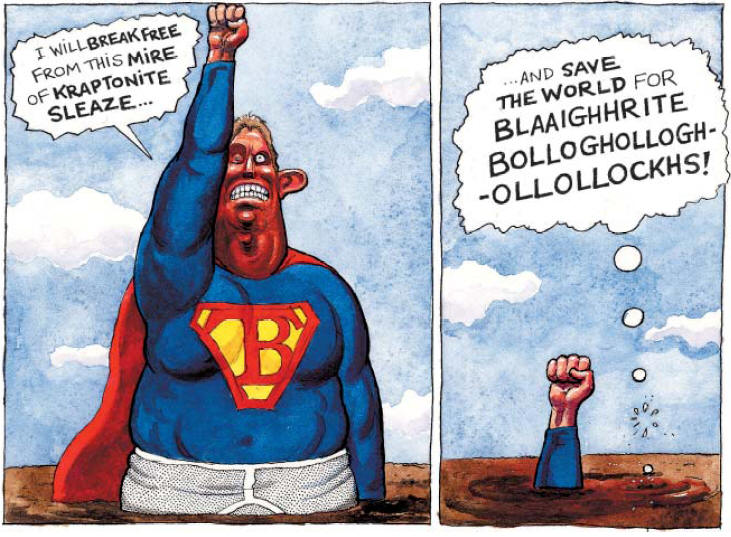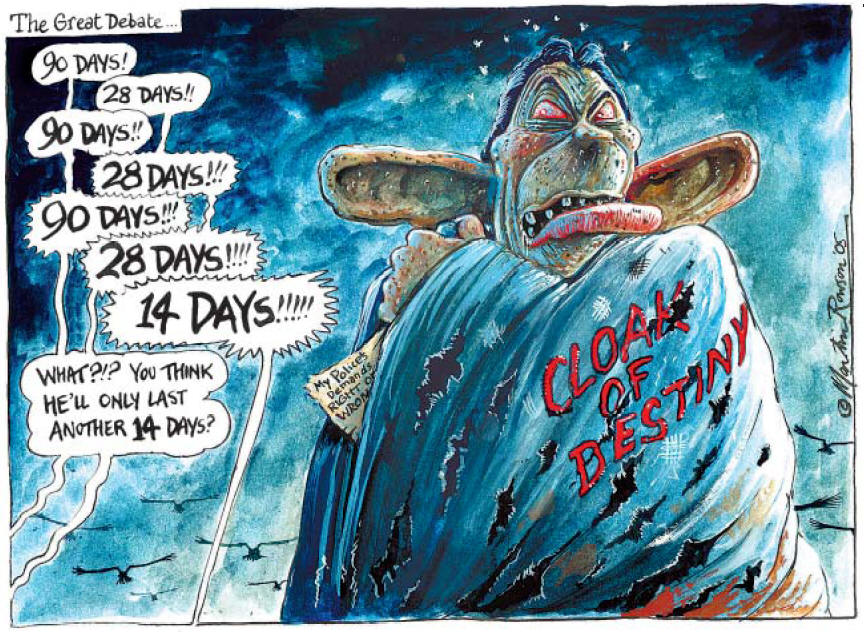|
History >
2005 > UK > Politics (I)

Schrank
cartoon
The Independent
13.11.2005
British Prime Minister Tony Blair
Lords threaten rough ride
for anti-terror
bill
Senior police oppose four key clauses
Monday November 21, 2005
The Guardian
Vikram Dodd, Richard Norton-Taylor and Michael White
Tony Blair warned the House of Lords last
night not to defy public opinion by moving to wreck the government's terror bill
today as further objections to the measures emerged from chief police officers
and the civil liberty lobby.
On the eve of the second reading in the Lords,
leaders of the Conservative and Liberal Democrat parties gave Downing Street
notice that they would give the bill "a thorough going-over" and scrutinise its
provisions line-by-line before sending it back to the Commons.
After a revolt by 49 Labour backbenchers, MPs have already modified a central
clause of the bill. It would now permit the police to hold terrorist suspects
for 28 days without charge pending further investigation - instead of the
current 14 and the 90 days initially proposed.
But the much-trumpeted support senior police officers gave that clause does not
extend to the entire bill, the Guardian has learned. The Association of Chief
Police Officers (Acpo) privately opposed four of the government's 14 main
proposals announced after the July 7 London bombings. Other proposals could
damage community relations, Acpo believes.
The confidential Acpo assessment of the 14 or so measures concludes that all
risk alienating Muslims. Senior officers believe they must increase the levels
of confidence British Muslims have in the police. According to a document seen
by the Guardian, the four measures from which Acpo withheld support were:
· Amending human rights laws to get round obstacles to new deportation rules.
· Making the justification or glorification of terrorism anywhere an offence.
· Automatically refusing asylum to anyone linked to terrorism anywhere.
· Banning the alleged extremist group Hizb ut-Tahrir and successor groups to
al-Muhajiroun. Acpo says it knows of no intelligence to justify a Hizb ut-Tahrir
ban.
The four measures are still in the bill and Acpo does support 10 of the 14
proposals announced by Mr Blair in August.
At the same time the Human Rights Watch lobbying group is warning that the
proposed offence of "encouraging terrorism" is likely to have a chilling effect
on free expression in classrooms, media newsrooms and mosques.
In a released briefing paper Human Rights Watch says the offence is "overly
broad" and does no more than duplicate existing criminal offences. It is also
highly critical of the glorification clause.
Despite such doubts, No 10 is sticking by Mr Blair's claim that it is better to
be right and defeated than back down.
"If the House of Lords in any way harries the bill before the peers tonight it
will be particularly out of touch with public opinion," a senior Blair adviser
warned after Lord Strathclyde, Tory leader in the Lords, appealed again for
cross-party consensus.
Both he and Lord McNally, the Lib Dem leader, said peers would probably be
satisfied with the 28-day compromise. But Lord Strathclyde warned ministers that
their failure to create a consensus means that "in the House of Lords inevitably
the parties of opposition and Labour rebels tend to come together to defeat the
government".
The Acpo document - written before the police were accused of being politicised
by the issue - assesses the likely impact on different communities of the
proposals. It confirms Acpo support for many of the measures, including
extending the time terrorism suspects can be held. But its support on this point
comes with a warning. "This measure is likely to be perceived as a non-judicial
way of incarcerating Muslims," it says.
Lords
threaten rough ride for anti-terror bill, G, 21.11.2005,
http://www.guardian.co.uk/terrorism/story/0,12780,1647283,00.html

Steve Bell
cartoon
The Guardian p. 33
4.11.2005
http://www.guardian.co.uk/cartoons/stevebell/0,7371,1627795,00.html
British Prime Minister Tony Blair as Superman
Blair: It's tough but we go on
· Labour MPs defiant after terror vote rebellion
· Backbenchers hope for more consultation
Patrick Wintour and Michael White The
Guardian
Friday November 4, 2005
http://politics.guardian.co.uk/labour/story/0,9061,1627473,00.html
After eight years in power
Tony Blair hears
a new word:
Defeat
Labour rebels leave terror plan in shreds
and question PM's future
Thursday November 10, 2005
The Guardian
Patrick Wintour
Tony Blair was facing backbench calls to stand
aside after nearly 63 Labour MPs inflicted a first, and overwhelming, Commons
defeat on his eight-year-old government, spurning his personal plea to respect
the police by giving them powers to detain terrorist suspects for up to 90 days.
In the biggest reverse for a government on a
whipped vote since James Callaghan's administration, Mr Blair was defeated
comprehensively by 322 to 291, with 49 Labour backbenchers, including 11 former
ministers, defying a three-line whip. Thirteen others abstained.
As the impact on the prime minister's authority sunk in, MPs then voted by 323
to 290 to support detention without charge for only 28 days, the position
advocated by the Liberal Democrats and the Tories. The scale of the defeat
rocked Labour whips, raising questions about Mr Blair's political judgment of
late and suggesting that he now has a permanent cadre of irreconcilable
backbenchers who neither listen to nor respect his views, leaving him in charge
of an effective minority administration on controversial issues.
The former cabinet minister Clare Short said the defeat presaged further
revolts. "It would be good for him, and certainly the Labour administration, if
he moved on quickly," she said. Another former minister, Frank Dobson, predicted
bigger revolts on Mr Blair's plans for schools.
Cabinet ministers insisted they would not water down their reform programme, but
they will have to redouble their efforts to explain their plans on education,
incapacity benefit and health reform.
Mr Blair, who personally decided to gamble by putting the 90-day detention to
the vote, sounded an uncomprehending note afterwards. "The country will think
parliament will have behaved in a deeply irresponsibly way, I have no doubt
about that at all," he said. "Sometimes it is better to do the right thing and
lose, than to win doing the wrong thing. I have no doubt what the right thing
was to do in this instance, to support the police.
"When the police say they are fighting mass-casualty terrorism and they provide
examples of why they need the powers, I think you need powerful reasons to turn
round and say no to them." He added: "There was every possible safeguard, with
the police having come back to a high court judge to make its case every seven
days".
He said he would not try to overturn last night's vote. "Parliament cannot be
treated like children, they know what the issues are."
Rejecting the notion of turning the reverse into a vote of confidence, the prime
minister again promised to serve a full term, adding that his main domestic
reform bills were unaffected. "In this business you get knocks the whole time.
Wait and see what happens with the main government programme, because I think
that is completely different. I don't think we will be defeated on those issues.
This was an issue on its own."
Michael Howard, the Conservative leader, said: "Mr Blair has been engaged in the
most appaling distortion of the arguments. Mr Blair's authority has been
diminished almost to vanishing point. This vote shows he is no longer able to
carry his own party with him. He must now consider his position." The Liberal
Democrat leader, Charles Kennedy, said the prime minister had to learn he needed
to build consensus.
Mr Blair's majority vanished even though the chief whip, Hilary Armstrong, sent
out a midnight SOS to the chancellor, Gordon Brown, and the foreign secretary,
Jack Straw, to return from important overseas visits to vote in the Commons and
sway colleagues. The party chairman, Ian McCartney, limped in from his hospital
bed after a triple heart bypass operation.
Even though Mr Brown, due to meet the Israeli prime minister yesterday, flew
back in the morning after less than an hour in Israel, he was unable to hold
back the avalanche. Few of his allies were taking pleasure in the outcome, aware
that they want the chancellor to inherit a united party.
The whips were taking some blame for signally misreading the mood of the party
after Mr Blair won accolades for a bravura performance at a private meeting with
Labour MPs. Others said it had been Downing Street and not the home secretary,
Charles Clarke, that had made the judgment call to go for broke with a vote on
90 days. Both the Home Office and the prime minister denied a split on tactics.
At an electric prime minister's questions, an angry Mr Blair tried to discomfort
the Tories. "When those charged with protecting our country provide, as they
have, a compelling case for action, I know what my duty is. My duty is to
support them, and so is the duty, in my view, of every member of this house." At
one point, Mr Blair looked about to lose his temper when one Tory shouted that
he was trying to set up a police state.
Mr Howard defended a position that has caused fissures in his own party, saying:
"We all want to fight terrorism effectively. But you don't have to look very far
beyond our shores to see what happens if you alienate minority communities."
Mr Blair's position weakened during the day when he discovered that the nine
Democratic Unionist MPs were going to vote against the government, angry at a
separate bill published yesterday giving an amnesty for terrorist on the run in
Northern Ireland. The forecast revolt of Conservative dissidents evaporated,
leaving Mr Blair hoping that his basic appeal to loyalty would save him. But the
rebellion spread beyond the usual suspects.
Many Labour rebels, including five new intake members, were angry, claiming that
Charles Clarke, the home secretary, had betrayed them last week when he
persuaded rebels to pull a vote by promising to come back with new proposals
based on a consensus. Mr Dobson said: "I think the police asked for three months
thinking they would get six weeks, and if the government had kept its promise
and come up with a compromise, that vote might have gone through."
Ian Paisley, the DUP leader, was more blunt: "Blair's authority has gone. He
should have a 60-odd majority, he has lost that. In no way could you put any
sugar on that cake. Indeed, it isn't even a cake. It is a crust."
After
eight years in power Tony Blair hears a new word: Defeat, G, 10.11.2005,
http://politics.guardian.co.uk/terrorism/story/0,15935,1639028,00.html

Martin Rowson
The Guardian p. 33
8.11.2005
http://www.guardian.co.uk/cartoons/martinrowson/0,7371,1636828,00.html
Blair talks tough but keeps options open on
90-day clause
· Terror bill Clarke prepares get-out compromise on detention
· PM presses security case on Labour rebels
Patrick Wintour The Guardian
Tuesday November 8, 2005
http://politics.guardian.co.uk/terrorism/story/0,15935,1636701,00.html
|